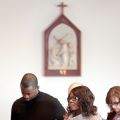Fifth Sunday of Lent (Year B) March 25 (Jeremiah 31:31-34; Psalm 51; Hebrews 5:7-9; John 12:20-33)
Human history is the story of broken promises. People break promises to one another; nations break covenants and treaties; and people let God down in very big ways. The result is shattered relationships and societies, and the most devastating of all, a sense of alienation and separation from God.
Consecrated by circumstance and need
By Fr. Ron RolheiserWe can lose our freedom for different reasons and, sometimes, for the best of reasons.
Imagine this scenario: You are on your way to a restaurant to meet a friend for dinner, a perfectly legitimate agenda, but en route you witness a car accident. Some of the people in the accident are seriously hurt and you are the first to arrive at the scene. At that moment your own agenda, dinner with a friend, is put on hold. You’ve lost your freedom and are, by circumstance and need, conscripted to remain there and help. You phone for an ambulance, you call for the police and you wait with the injured until help arrives.
God is mercy and love
By Fr. Scott Lewis, S.JFourth Sunday of Lent (Year B) March 18 (2 Chronicles 36:14-17, 19-23; Psalm 137; Ephesians 2:4-10; John 3:14-21)
All written histories are interpretations of events rather than “cold, hard facts.” Historians have a lens through which they view the world and events. They usually seek to demonstrate their own ideas through the arrangement, selection and interpretation of events. For example, I and II Chronicles are theological reinterpretations of Israel’s history after the painful 70-year exile in Babylon and the return of the people to Jerusalem.
Porous and buffered personalities
By Fr. Ron RolheiserA friend of mine tells this story: As a young boy in the 1950s he was struck down with pneumonia. His family lived in a small town that had neither a hospital nor a doctor. His father had a job which had taken him away from the family for that week. His mother was home alone with no phone and no car. Frightened and completely without resources, she came to his sick bed, knelt beside it, pinned a medal of St. Therese of Lisieux to his pyjamas and prayed to St. Therese in words to this effect: “I’m trusting you to make my child better. I’m going to remain kneeling here until his fever breaks.”
Both my friend and his mother eventually fell asleep, he in his sick bed, she kneeling beside it. When they woke, his fever had broken.
The cross is the door to the new temple
By Fr. Scott Lewis, S.JThird Sunday of Lent (Year B) March 11 (Exodus 20:1-17; Psalm 19; 1 Corinthians 1:18, 22-25; John 2:13-25)
Are the Ten Commandments old-fashioned or obsolete? There are those who think so. Cynics have sometimes called them the 10 suggestions or have mused on what would happen if archeologists discovered a tablet with numbers 11 through 20 inscribed on them. But they are as valid today as ever.
Six ways to avoid Lent (but it won’t be easy)
By Mary MarroccoLent this year has been going on for a while now, but it’s not too late to get around it. For those reluctant to join with the many who are making a Lenten sacrifice and are instead looking for reliable methods to escape Lent, I offer six suggestions. Use at your own pace.
1. Don’t enter a church. Lent is everywhere in there these days, in the words, the music, the smells, the wall hangings. Even if you do happen to wander into a church or two, there are still ways to avoid Lent while inside, including the techniques listed below.
Finding gratitude through my illness
By Fr. Ron RolheiserAs a columnist, I’ve always harbored a certain paranoia about being overly personal or exhibitionistic or in thinking my own emotional ups and downs are of interest to others. I’ve tried to respect that fear. Occasionally, however, circumstance dictates that I do write something more personal. This is such an occasion.
I want to express my gratitude for all the prayers and support I have received during these past seven months while undergoing treatments for cancer. That desert-journey has finally ended, and with a good result. Just over a month ago, I finished my last chemotherapy treatment and, three weeks ago, after a battery of tests, was pronounced “cancer-free.” To God, family, friends, colleagues and to the many who have supported me in prayer: Thank you!
John Updike, in a poem entitled “Fever,” once wrote about what illness might teach us:
Jesus Christ’s love for mankind holds nothing back
By Fr. Scott Lewis, S.JSecond Sunday of Lent (Year B) March 4 (Genesis 22:1-2, 9a, 10-13, 15-18; Psalm 116; Rom 8:31b-34; Mk 9:2-10)
Can you imagine being asked to give away your most precious possession — a gift for which you had waited your entire life? And what if that prized gift was a beloved child?
The struggle between dancing and mourning
By Fr. Ron RolheiserHenri Nouwen used to publish some of his diaries under the title On Mourning and Dancing. The title was wholly appropriate since those diaries chronicled much of his own struggle to give public expression to what was bubbling up inside of him and, at the same time, respect a highly sensitive self-consciousness and reticence that made him hesitate to publicly express those same feelings.
And so his writings are a rare expression of both inner freedom and inner fear. His thoughts and feelings are sometimes tortured, but that’s what makes them rich. It’s not always easy to find that delicate balance between healthy self-expression and unhealthy exhibitionism, even if you are Henri Nouwen — or perhaps especially if you are Henri Nouwen.
We can be instruments of God’s reign
By Fr. Scott Lewis, S.JFirst Sunday of Lent (Year B) Feb. 26 (Genesis 9:8-15; Psalm 25; 1 Peter 3:18-22; Mark 1:12-15)
What is the connection between a beautiful rainbow and the aftermath of a catastrophic flood? To our own minds, there is no connection at all. The flood is the result of natural forces — rain, wind and tides — and there is little or no meaning in it. A rainbow, as beautiful as it is, is caused by the sun being refracted through the moisture in the air. But if you are a person living in the ancient world, every manifestation of nature is the hand of God. Ancient people “connected dots” — event “B” occurred after event “A,” therefore “A” must have been the cause, with God as the ultimate connection between all events.
Other sheep not of our flock
By Fr. Ron RolheiserI grew up with strong, conservative, Roman Catholic roots: the Baltimore Catechism, the Latin Mass, daily rosary, daily Mass if possible and a rich stream of devotional practices. And that’s a gift for which I’m deeply grateful.
But that wonderful grounding also brought with it a distrust of all religious things not Roman Catholic. I was taught that the Roman Catholic Church was the only true Church and the only road to heaven; so much so that we were strongly discouraged and tacitly forbidden to participate in any Protestant services. In fairness to that catechesis, we didn’t believe Protestants and other religious communities were doomed to eternal perdition, but we struggled mightily to articulate how this might take place. Among other things, we postulated a place we called Limbo, where sincere, non-Roman Catholics with good souls might spend eternity, happy but without God.










